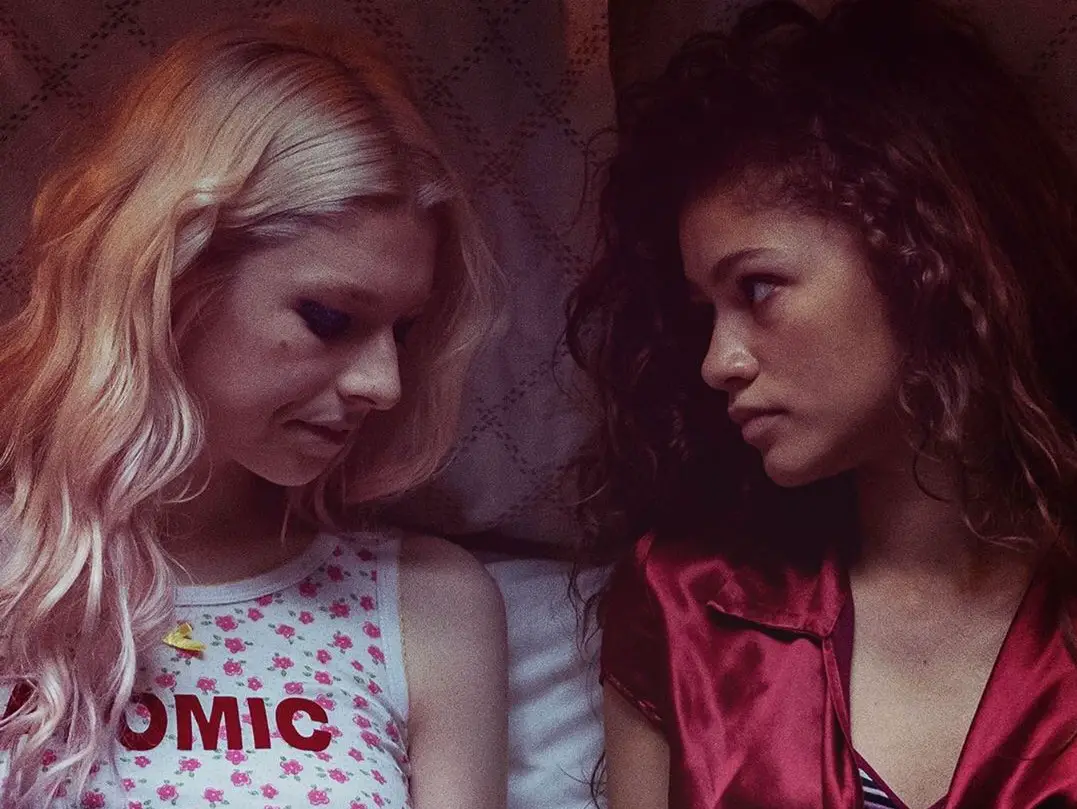Amidst its themes of drugs and addiction, “Euphoria” addresses the implications of online hook-ups and porn culture in real-life interactions among young adults. HBO’s new series encourages audiences to think about how online ideals (or fantasies) of sex, love and beauty cannot be successfully applied to real-life situations.
In providing this commentary, “Euphoria” neither condemns nor patronizes Generation Z and even notes how older generations are too being sucked into unachievable fantasies.
Fresh out of rehab with “no intention of staying clean” is high school junior Rue Bennett (Zendaya), the show’s protagonist and narrator. She suffers from mental health issues, including anxiety attacks that fog her mind and cause her to pass out. Rue’s habit of using drugs allows her to fully embrace the fog — to experience the euphoria of numbness.
Scenes with Rue include everything from being onstage in front of her class, struggling to breathe and holding back tears, to scrambling across backyards in the middle of the night to audaciously ask a friend for a clean urine sample. She is a struggling and strung-out teenager, but episode 3 inspires hope for her recovery while she attempts to earn back her family’s trust.
Rue as the narrator, however, is where the storytelling that is free of judgment occurs. Her voiceover is blunt, factual and emotionless, unlike her character. It is through the narration that the audience finds itself unable to pass judgement on the characters.
Rue’s disembodied voice describes scenes of jealousy, fear, anger and regret. Even the most explicitly sexual or physically graphic scenes are narrated in a voice that resembles a bored waitress reading the specials for the dozenth time today.
Some critics note that “Euphoria” seems to be just another doom-and-gloom warning to older generations about the devastatingly reckless life choices of today’s irresponsible youth — or that it is meant to enlighten parents of preteens about the vices to which their children will soon succumb.
As the narrator, Rue dispels those theories and leads audiences to believe that this behavior is simply a piece of life. She plainly discusses taboos that have now become mainstream. “Euphoria,” albeit an overdramatized version, is our world, and Rue describes what archaic taboos prevent society from understanding.
Before the mass proliferation of the internet, porn consisted of Playboy magazines hidden in the garage or under beds. They were novelties and indulgences advertised as entertainment. Those who read adult magazines were not led to believe the pages reflected actual human interactions.
As “Euphoria” demonstrates, people of all generations have turned to porn as a “how-to” manual for sex. Graphic forms of pornography are widely available online, but sex and porn remain socially taboo topics. This has contributed to a culture in which online hook-ups and porn are common aspects of dating and sex but are still resigned to a corner as “dirty” topics.
The reluctance to be open about these realities in conversation has also allowed the porn industry to successfully market choreographed scenes as something representative of real interactions. For a many of the characters in “Euphoria,” these expectations lead to uncomfortable sexual experiences.
In the pilot, Jules Vaughn (Hunter Schafer) meets DominantDaddy (Eric Dane), the username of someone from an adult dating app, at a motel. Although she gets cold feet for a moment, the audience can tell that Jules is no stranger to dating apps or hook-up culture. Older generations watching “Euphoria” may expect this rendezvous to turn into an episode of “SVU” or “Dateline,” but that’s not what happens.
Instead, DominantDaddy’s photos of wine and candles leave viewers feeling uncomfortable and confused. The audience does not see a face at first, but they hear him whisper to Jules and slide his thumb in her mouth, which creates an atmosphere of eeriness rather than seductiveness. The camera pans to his face just before he tears off her tights and has sex with her.
Not only does the sex skirt the lines of consent, it is so impersonal and mechanical that it seems like a poorly crafted porno. In episode 2, viewers discover that DominantDaddy (who is later revealed to be Cal Jacobs, the father of Jules’s classmate, Nate) keeps a drawer of at least two dozen porn tapes, all of which are identical to the motel room scene.
Instead of recognizing porn as fantasy and entertainment, Cal identically reenacts his porn collection with various female liaisons. There is no thrill, romance or real person-to-person interaction. He replays his porn DVD with Jules, then quickly gets off the bed to shower.
Cal is a middle age man with a porn addiction so intense that it inhibits a healthy sex life — and Jules is not entirely comfortable with what happened. The only insight the brutally honest narrator gives the audience is, “Jules would have had a better time if she just went to the party [at a classmate’s house] instead.”
“Euphoria” shows viewers that something is definitely wrong with the encounter, but a singular person is not to blame.
Later at that same party, audiences find Kat Hernandez (Barbie Ferreira) talking with three guys about sex and virginity. They casually ask her if she is a “slut or a prude” with no alternative option. Fearing that they will find out she is a virgin, Kat agrees to sleep with them.
What follows is a repeat of the motel scene — impersonal and dehumanizing. Oh, and the encounter is posted to a porn site without her knowing. Kat is understandably disturbed about the hundreds of thousands of views, which leads to an awkward conversation with her principal.
But Kat quickly learns how to play the game. Operating under the name “Thunder-Kit-Kat,” Kat dives into the world of self-made internet porn, kinks and men who will pay her $100 simply because she asks. Despite recently losing her virginity, Kat is no stranger to the unrealistic fantasies on the internet.
As a preteen, Kat was social media famous on Tumblr for her graphic, smutty fanfiction, and her experience is not confined to the world of “Euphoria.” Since the early 2000s, teens have been writing and creating images of sexualized fanfiction online and seem to have lost the notion that fanfiction, like porn, is in fact, fiction.
After three episodes of “Euphoria,” the only healthy romantic-sexual relationship is between Cassie Howard (Sydney Sweeney) and Chris McKay (Algee Smith) — and even their first encounter was rocky. Chris imagines dating Cassie and having a sweet boyfriend-girlfriend relationship, but Rue’s narration says that Chris’s friends poison his idea of Cassie by saying girls want it rough, like in porn.
So, when the mood is right and the young lovebirds get busy in the bedroom, Chris begins choking Cassie. As the strangulation gets more intense, Rue narrates, “This is not about to turn into rape. I promise.” Cassie pushes Chris off and explains that sex is not like porn and he cannot choke her that roughly.
In a later episode, Chris calls out Cassie for “making everything sexual.” Chris was too rough because that’s what porn told him to do, and Cassie was too sexual at inappropriate times because that is the only way she knows to keep a man. By simply communicating what they each want and expect, they avoid some of the sexual calamities their friends endure.
The world of “Euphoria” mimics our own: Snapchat makes sending nudes easy, Tumblr fulfills the need for smut and porn sites might soon take over dating apps in popularity. Needs are instantly gratified via a fantasy, and sex is not intimate — it’s public. “Euphoria” doesn’t condemn Generation Z for this because it’s not their fault — nor are they the only ones implicated.
Yes, the culture that has been created is deplorable, but blaming the victims, who don’t even know they’ve been victimized, is not the solution. Maybe there is no solution. “Euphoria” simply tells a story about society, and the audience is meant to be a witness, not a jury. What was once taboo is no longer, and “Euphoria” does not pretend that certain topics are still unspeakable.
















